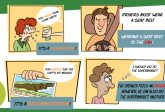Reflexive pronouns
There are many ways of saying goodbye in English. The most common is probably see you but we can also say cheers, take care, see you later or catch you later. Another expression we might use is take care of yourself, especially if someone has been sick or going through a rough patch.
In the expression take care of yourself, we are using the reflexive pronoun
yourself. In this blog we will look at when to use the reflexive pronouns in English.
The reflexive pronouns
The reflexive pronouns are:
Myself
Yourself
Himself
Herself
Itself
Oneself (formal)
Ourselves
Yourselves
Themselves
When do we use the reflexive pronouns?
As a direct object
We use the reflexive pronouns in English as a direct object, when the object is the same as the subject of a verb.
For example, if you cut your finger while you were chopping an onion you might say
I cut myself while I was chopping an onion.
In this sentence, I is the subject of the verb. This means I is the person who does the action. The word myself refers to the same person. Myself is the object of the verb cut. This means it is the person or thing that receives the action.
In this case we must use the reflexive pronoun myself, not the object pronoun me. So, we cannot say:
I cut me while I was chopping an onion.
We must say:
I cut myself while I was chopping an onion.
Here are some more examples of reflexive pronouns used as the direct object:
Jane blamed herself for the accident.
Ask yourself this question: Am I happy with my job?
Terry hates himself.
I saw a bird washing itself.
We treated ourselves to an ice cream.
As an indirect object
Some verbs can be followed by two objects. The indirect object is often a person who receives something. Look at this sentence:
I gave the book to Mary.
In this example I is the subject of the verb gave and the book is the object.
We could also say:
I gave Mary the book.
In this sentence Mary is now the indirect object.
If the indirect object is the same person or thing as the subject, we must use a reflexive pronoun. Here are some examples:
John cooked himself dinner.
I bought myself a pizza.
She poured herself a glass of wine.
They taught themselves French.
After a prepostition
Instead of using an indirect object after the verb, we often use a preposition after the direct object, followed by a reflexive pronoun. For example:
John cooked dinner for himself.
I bought a pizza for myself.
She poured a glass of wine for herself.
They taught French to themselves.
Test Yourself
Vocabulary
To chop: To cut something into pieces with a knife or axe
To blame: To say someone did something wrong
To treat oneself: To buy something or do something nice for yourself
Thank you for reading our post. You’ll find more English grammar tips elsewhere on our site and if you’d like information on our English courses in Dublin, please do not hesitate to contact us.




